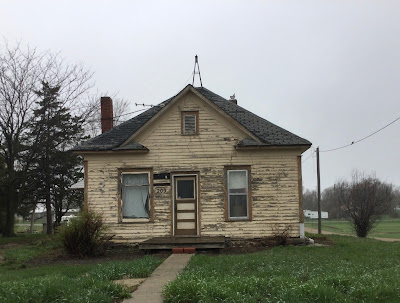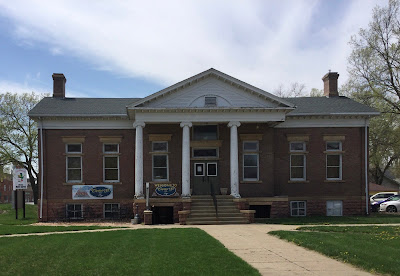I stopped to ask a trio of older folks at a main intersection in downtown Yankton, who were holding and distributing campaign signs for a candidate for governor in next month’s primary, if there was a bike shop in town. I was in need of a new front tire. I knew starting the trip I’d get a thousand miles or so out of it, which was about right, as I suffered my first flat the day before. I had been targeting Yankton as a town that would have a bike shop as not only was it a fairly large city but also a college town, or so I believed. The huge hospital on the outskirts of the city bolstered my confidence.
The campaigners affirmed there was a bike shop—the Ace Hardware Store a mile away up Broadway. I was hoping for more than that, but at least there was a store that probably had tires. If not, I’d have to resort to the Walmart, my first in over a week. I also asked them the whereabouts of the Carnegie Library. It was just a couple blocks away. Yankton College also had a Carnegie. They gave me the surprising news that the college had closed in 1984 and was now a Federal Prison.
My final question for them was if there was a statue of Lyle Alzado on the campus, not sure if they’d know or remember the star defensive end who played for its football team in the early ‘70s and went on to have a distinguished fifteen-year career in the NFL, some of those years playing on the Oakland Raiders, culminating with a Super Bowl win in 1983 co-anchoring its defensive line with Hall-of-Famer Howie Long. He’d also had a movie and television career before dying of brain cancer in 1992. All three of them burst into laughter at the mention of Alzado, delighted to be reminded of this charismatic figure, and said that he had been a great supporter of the school when it was trying to be saved.
I didn’t tell them that I knew Alzado, as I spent three weeks with him in August of 1971 when he was on the College All-Star football team practicing at Northwestern and staying at the Orrington Hotel in preparation for the first pre-season game of the year against the previous year’s Super Bowl champs, a game inaugurated by the Chicago Tribune Charities in 1934 and was last played in 1976. I was a manager for the team, as I was for Northwestern, chasing after balls on the practice field and ferrying the players from the hotel to the practice field and various other errands while also staying at the Orrington and dining with the team. Needless to say, it was a most exhilarating experience that I was privileged to have my four years at Northwestern.
Alzado was one of the few players who brought his car to Evanston. He was due to report to the Denver Broncos, the team that drafted him, immediately after the game. He couldn’t drive so asked if I’d be interested in driving it to Denver for him. I gladly accepted. When I delivered it to him he said he didn’t have a check or cash in this pre-ATM era and would send me a check later.
When he didn’t, I enlisted the Tribune, which had a popular column at the time of solving problems for people. That did the trick accompanied by the lame apology that he had lost my address. In my letter to the Tribune explaining the situation, which was published, I wrote, “as a pauper student I can ill afford to write off the $200 he owed for my expenses and small stipend.” Some disgruntled alum responded with a letter to me in care of the Northwestern athletic department that he was most weary of solicitations from Northwestern wanting money to subsidize “paupers.”
For years I have been curious to visit the campus of the small, obscure school that produced this prominent football player. Much was made throughout his career that this Brooklyn-born player with a Jewish mother and Italian father had emerged from this unknown South Dakota college, drafted in the fourth-round after catching the the eye of a Bronco’s scout. Thanks to a pair of Carnegie Libraries I had at last the opportunity to make the acquaintance of this small city on the Missouri River.
Its Carnegie was in sorry shape, missing one of its four columns. It now houses a law firm on its first floor and a pub in its basement. It was on Capital Street across from where the first capital of the Dakota Territory stood after Lincoln established it in 1861. A plaque told the lamentable tale of how Yankton had its status as capital stolen from it in 1883 by monied interests who wanted it elsewhere. Yankton took the case to the Supreme Court but lost. The plaque concluded the saga stating, “Yankton has a fine historic site a few rods north of this marker and a bitter memory.”
With Yankton College now a minimum-security federal prison with not a strand of barbed wire to be seen but “no trespassing” signs everywhere I had to peer at its Carnegie from a distance with prisoners in casual grey attire, some in shorts, milling about.
Then it was on to Ace Hardware and hopes of a tire. I was taken aback to see a veritable bicycle shop, a Trek dealer no less, adjoining the hardware store. It’s entrance was through the hardware store, and it’s three employees were wearing Ace Hardware shirts. I was happy to see a rack of tires, though none were my size. I had to settle on a fold-up, which is favored by many these days. It didn’t have as much tread as I’d like, but it would do. One salesman was demonstrating an e-bike to a customer. The shop had been affiliated with Ace since it opened initially as a Schwinn dealership in 1974.
I had a tight set of three Carnegies the day before all in small towns and none with an addition. Wagner’s was vacant and in a neglected state. The present library was a mere room in the city hall and didn’t have WiFi. I had to go to a service station/cafe for that.
The other two Carnegies still served as libraries and had a much more distinguished bearing. Armour’s was constructed of yellow brick and had a portico for an entry up several steps and past a pair of globular lights.
The red-brick Carnegie in Tyndall had the addition of a statue of a young girl sitting by the railing up the steps to its entry reading a book. I had to peer in through the locked door for a look at the always pleasing original rounded wooden circulation desk, a virtual throne for the librarian.
With the winds back lashing the land at better than twenty-five miles per hour I resorted to pitching my tent behind a beer distributor on Saturday night as shelter from the wind, not anticipating anyone coming around in the morning.
I could have gone to an official campground along the Missouri but I would have had to backtrack five miles. An extra ten miles there and back was much more than I wanted to endure in such winds where every mile is a triumph. It rained for several hours during the night, flooding out the worms in the vicinity, many of whom were drawn by the shelter of my tent and perhaps my body heat. There was a mass of them when I rolled up my tent.










No comments:
Post a Comment